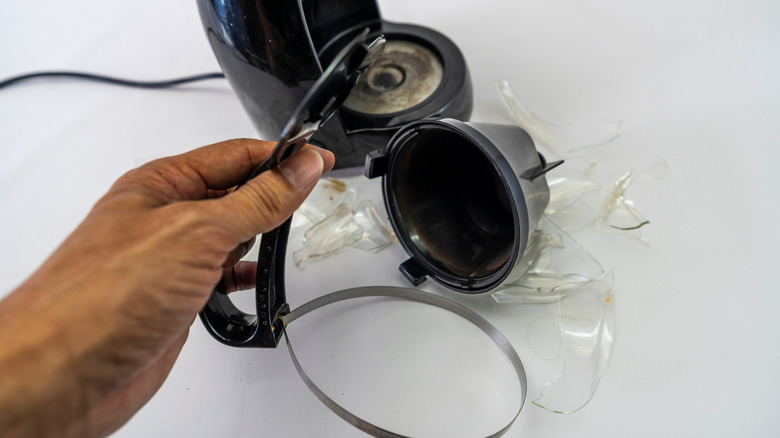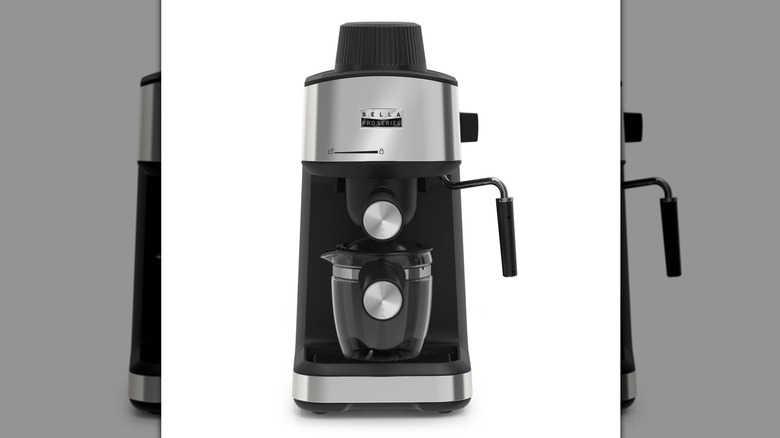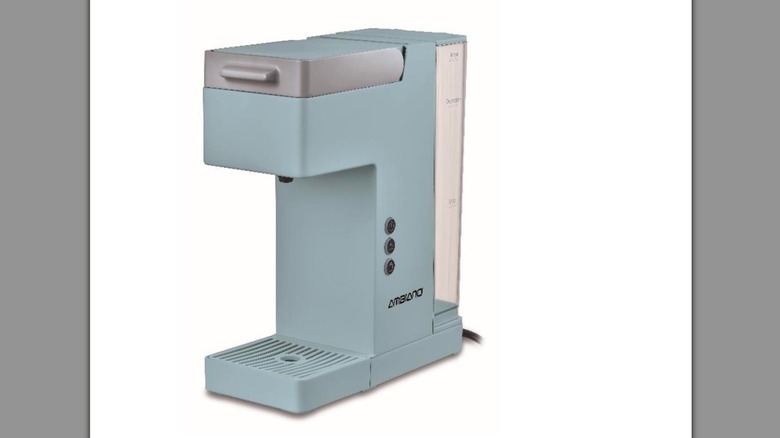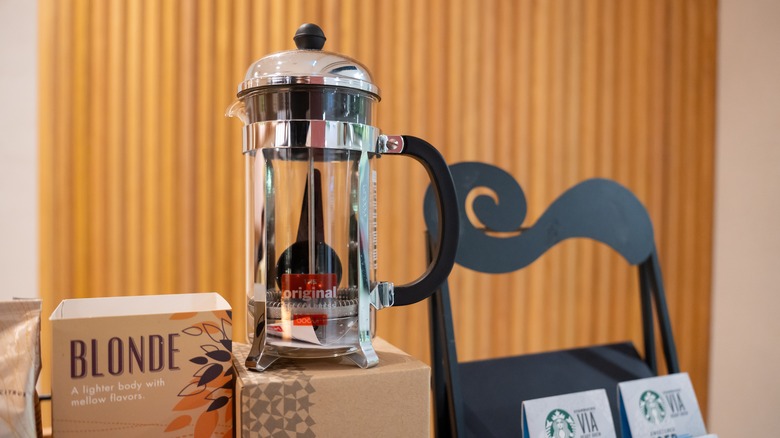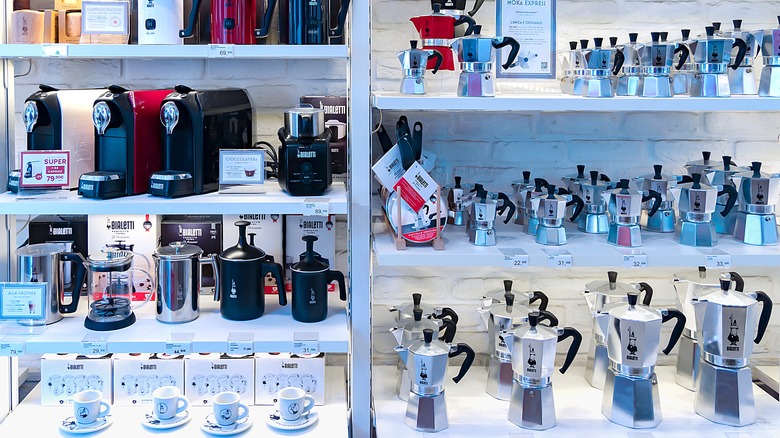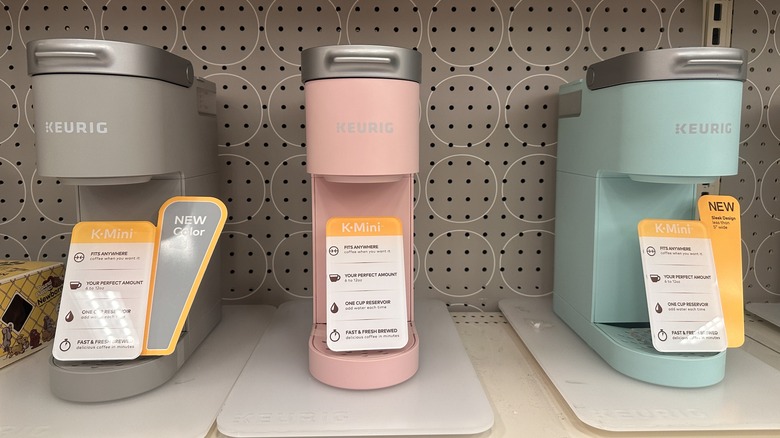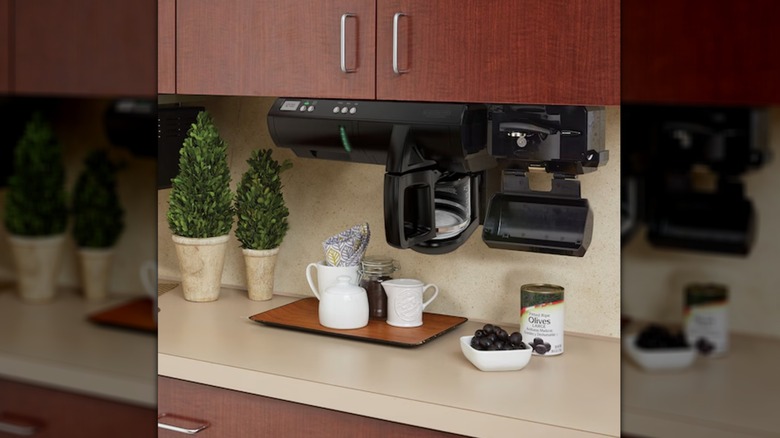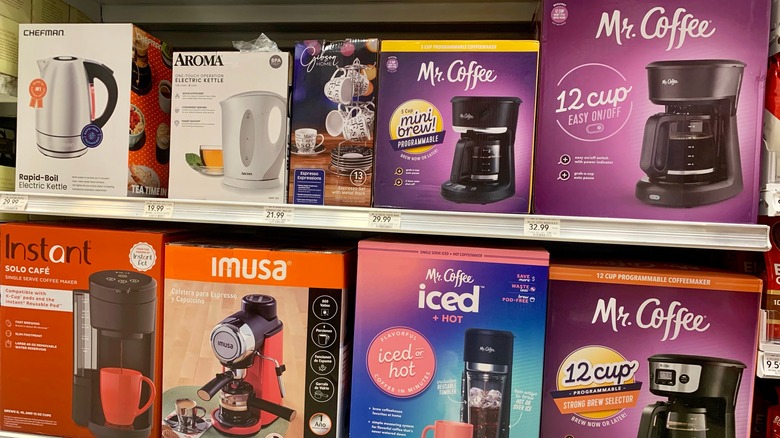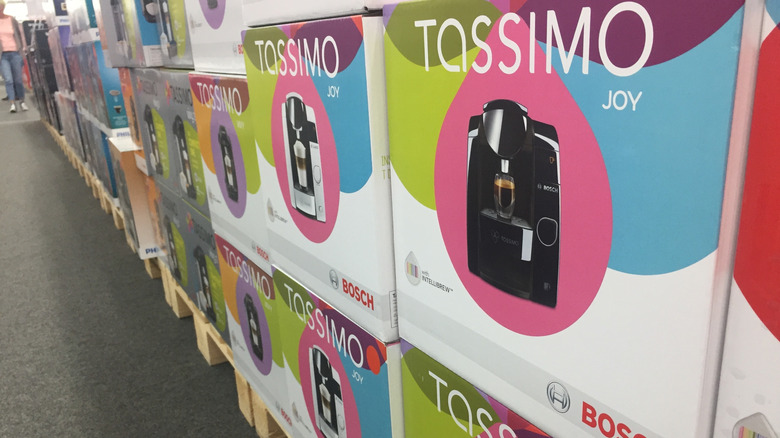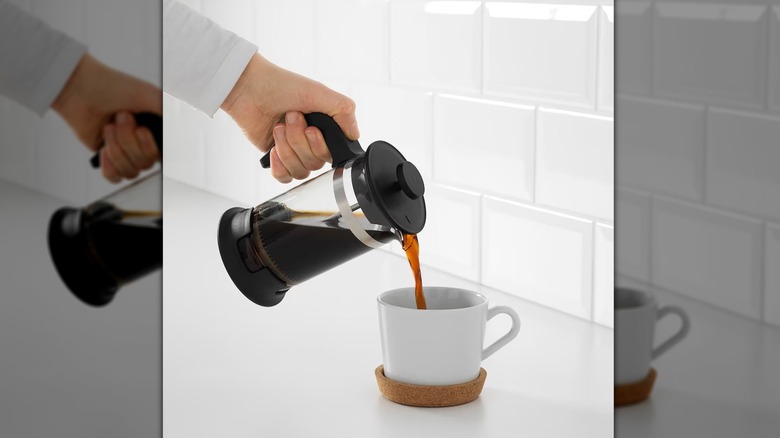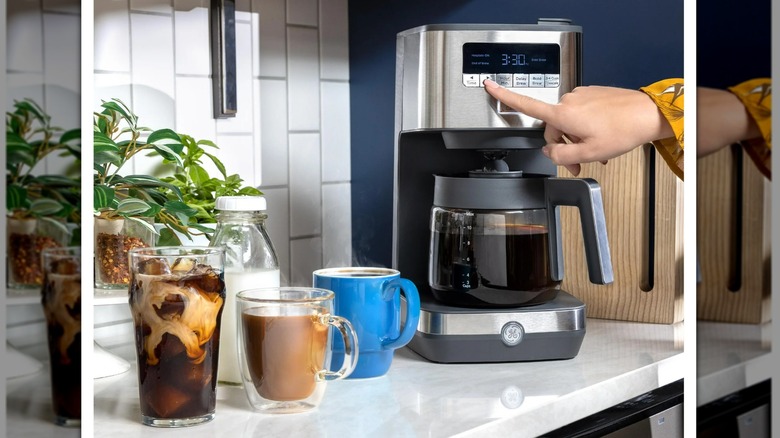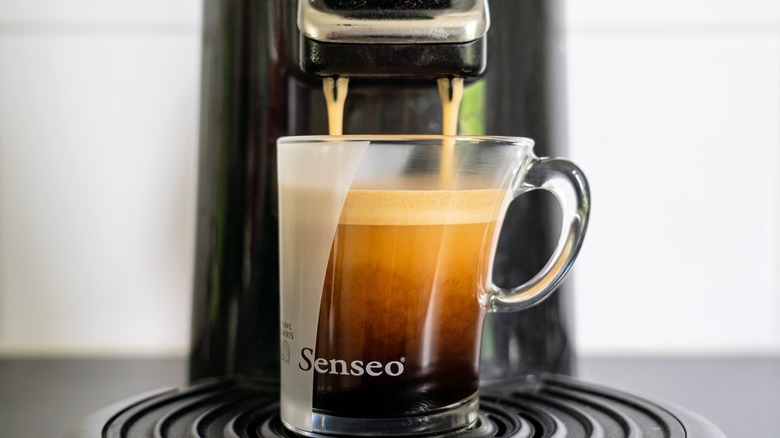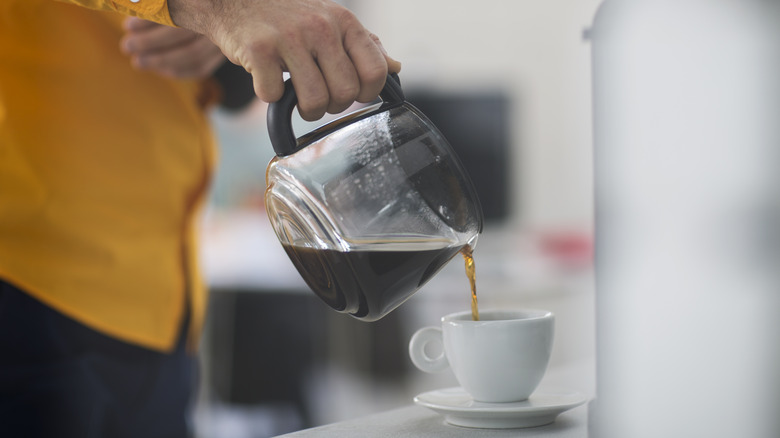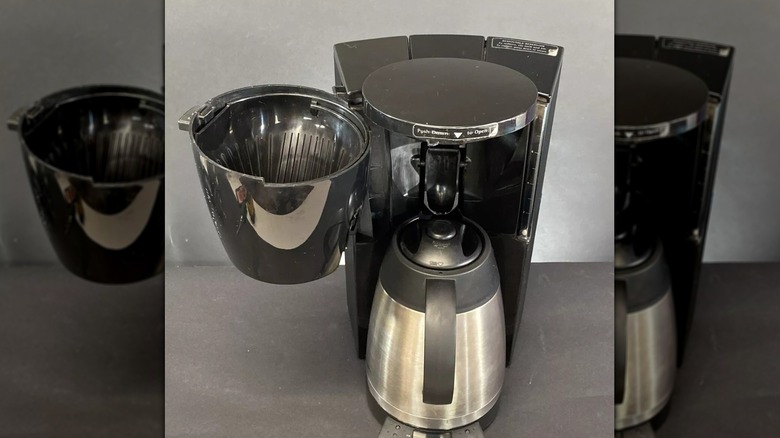Coffee Maker Recalls That Impacted Millions
We may receive a commission on purchases made from links.
Whether you have an espresso machine at the ready, you rely on a good ol' fashioned drip coffee maker, or you're a staunch supporter of the French press, if you are a daily coffee drinker, you've likely come to heavily rely on your coffee maker. If it failed you, what would you do? How would you start the day off on the right (alert and awake) note? You probably do not even want to think about how different your life would be if you had to live without your beloved coffee maker for a period.
Unfortunately, from time to time, coffee makers — even those produced by well-respected brands — go on the fritz, and we are not just talking about stopping working for seemingly no reason at all. Sometimes, coffee makers can develop such issues that they become a downright hazard, even causing severe injuries to those individuals unfortunate enough to be caught in their line of (sometimes literal) fire. Are you having a hard time imagining it? Just take a look at these coffee maker recalls from the last two decades that have impacted millions.
Bella espresso machines recalled due to burn risk (2025)
In March 2025, Sensio recalled its Bella Pro Series and Cooks steam espresso makers, urging buyers to return the espresso machines for a full refund. The maker estimated that more than 12,000 espresso machines needed to be recalled, and for a very good reason. At the time the recall was published, nearly 20 customers had reported that the espresso makers' brew handles had forcibly ejected during espresso maker use. In fact, the handles ejected with such force that the makers' glass carafes shattered, leaving at least eight people with burn injuries or cuts from the shattering glass. The machines had been sold at JCPenney and Best Buy.
This is not the first issue that the Bella housewares brand has run into in recent history. In 2023, Sensio likewise recalled approximately 860,000 of its Bella electric and stovetop pressure cookers, noting that the pressure cooker's lid could unlock while the pressure cooker was in use, posing burn hazards to anyone in the cooker's vicinity.
Aldi recalls single-serve coffee makers due to burn hazard (2024)
In August 2024, the fan-favorite grocery store Aldi recalled the store's Ambiano single-serve coffee makers. The coffee makers, which were an affordable alternative to a Keurig single-serve coffee maker, and sold in a series of fun pastel colors, were recalled after the store had received more than two dozen complaints that the coffee makers were spewing hot water from their tops, resulting in burn injuries in at least three cases. Even before the recall, it seems that users were having problems with the maker spewing, splattering, and sputtering, as buyers reported on Reddit.
The coffee makers had been sold in 38 states and approximately 28,000 coffee makers were affected. While customers could choose to return the coffee makers to their nearest Aldi store for a refund, the chain also gave customers the unique option of proving that they owned the recalled product online, after which they could receive a $75 Aldi gift card instead of the coffee maker's $50 sale price.
Starbucks recalls coffee presses due to laceration hazard (2019)
In 2019, Starbucks recalled more than a quarter of a million recycled coffee presses that had been distributed across both the United States and Canada, because, the brand said, the press' plunger knob could break off, exposing the interior metal rod. Of course, you can probably imagine how that might go down, if you were using the coffee press, putting a lot of weight on the plunger knob, and it suddenly snaps, so there is no need for us to get into the gory details. At the time of recall, Starbucks reported it had received eight reports of the plunger knobs breaking off, and in one case, a user had experienced cuts and "puncture injuries."
Starbucks advised buyers to stop using the coffee presses immediately, but said it would not be giving out refunds for the presses and that stores wouldn't take the presses back. Instead, the company asked buyers to contact Starbucks for further instructions on how to get store credit for their trouble.
Bialetti coffee presses recalled for risk of broken glass (2017)
In another instance of coffee presses being prone to breaking, importer Bradshaw International recalled Bialetti-branded coffee presses that had been sold nationwide, both in-store, at Fred Meyer, Kroger, Ross, Target and HomeGoods locations, and online via Amazon. More than 85,000 coffee presses were impacted and Bradshaw International reported that the coffee press' glass exterior was prone to breaking, as had been reported by at least three customers, two of which needed stitches after using the glass and plastic presses. Customers were instructed to stop using the product immediately and contact Bradshaw International to receive a replacement coffee press.
If the Bialetti brand sounds familiar, it's because it is the maker of the moka pot — a coffee aficionado favorite that's developed a bit of a cult following. If you're eager to try out a Bialetti product, then keep with the classic cast aluminum moka pot and leave the glass and plastic presses at the store.
Keurig recalls single-serving coffee machines due to burns (2014)
In 2014, Keurig issued a massive recall that, in total, affected more than 7 million Keurig MINI Plus Brewing System single-serve coffee machines across both the United States and Canada. Unfortunately, the recall was issued two days before Christmas, so you know it is likely that some folks received recalled Keurigs for the holiday. Reports noted that the machines could overheat water, causing the water to spray out of the machines and burn users, with the issue more often occurring if the user tried to brew more than two cups of coffee, one after the other. Keurig received about 200 reports of this issue, about half of which included report of burn injuries.
Unfortunately, Keurig did not offer to replace the machines or refund buyers' money; instead, the brand offered to send consumers a repair kit so they could repair their faulty machines themselves. While waiting for the kit, the brand offered guidance as to how consumers could avoid burns. The coffee makers had been sold all over North America, at Kmart, Kohl's, Target, and Walmart.
Black & Decker recalls coffee makers due to breaking handles (2012)
While you're not likely to see these household appliances as often as you might a Keurig, Black & Decker offers a SpaceMaker series of countertop appliances designed to, well, make space on your countertops, as the appliances can be mounted to the underside of your top row of cabinets. There's a SpaceMaker can opener, for example, and then also a SpaceMaker 12-Cup Programmable Under-the-Cabinet Coffeemaker — and, in 2012, about 160,000 of these coffee makers were recalled due to breaking coffee pot handles, which could lead to burns and cuts.
Black & Decker had sold the impacted coffee makers from 2008 to 2012 at major retailers nationwide, and received nearly 1,300 reports of the coffee makers' handles breaking, as well as 70 reports of the incidents causing burns and/or cuts. While you can still find the Black & Decker SpaceMaker coffee maker listed on the brand's website, it doesn't seem to be for sale any longer.
Mr. Coffee recalls coffee makers that spit out hot grounds and water (2012)
Also in 2012, Mr. Coffee issued a recall, warning consumers that its single-cup coffee makers — much like many other Keurig copycats — were capable of burning users, when steam built up in the machine's water reservoir, causing the brewing chamber to pop open and spit out coffee grounds and water. More than 600,000 coffee makers were recalled, with Mr. Coffee replacing the makers for free. Approximately 164 people had reported incidents with the machine, with more than 60 people saying they'd experienced burns on their face, torso, and/or hands. Mr. Coffee had sold the makers across both the United States and Canada, in stores such as Bed Bath & Beyond, JC Penney, Kmart, Lowe's, Target, and Walmart.
This recall, however, was nothing compared to the Mr. Coffee recall of 1977. That year, the brand recalled more than 3 million coffee makers as it was determined the coffee makers could shock users or even catch fire.
Tassimo single-serve coffee makers recalled due to burn risk (2012)
The year 2012 was seemingly a risky year to own a single-serve coffee maker. In February 2012, Tassimo recalled nearly 2 million Tassimo and Bosch single-cup brewers, due to the plastic disc within the brewers' likelihood of bursting, spraying hot water and whatever is brewing, coffee or tea, onto users, burning them. The recall applied to various models of coffee makers sold over both the United States and Canada, and Tassimo offered affected users a replacement part that supposedly would solve the issue.
More than a hundred customers had reported their coffee makers malfunctioning and spraying hot water. Nearly 40 of those individuals said that someone in their home had received second-degree burns as a result of the malfunction. In one instance, a 10-year-old girl was the victim and the burns to her neck and face were so severe that she was hospitalized. The mother of the 10-year-old girl, though, told ABC News that the traumatic incident — which required surgery and synthetic skin grafting — occurred more than a year before the recall, and she didn't "see why nothing was pulled off the shelf before" February 2012.
IKEA recalls French press coffee makers due to shattering glass (2011)
Shattering glass seems to plague a not-insignificant number of French press-style coffee makers that rely on the user to push down a pump-style handle, pressing their coffee or tea down into a glass cylinder. In 2011, IKEA recalled its glass Forsta coffee and tea makers, stating that the pressure from the pot's metal pieces could cause the glass cylinder to break unexpectedly, potentially burning and cutting users. IKEA had sold the coffee makers in both the United States and Canada, with about 130,000 units impacted.
Luckily, at the time of the recall, IKEA said it had only received 20 reports of the coffee makers breaking, though 12 people did report burn injuries and one person did report a laceration. Consumers could return their affected coffee maker to any IKEA location and receive a full refund. Today, IKEA no longer sells the Forsta coffee maker, but it does have a very similar glass French press option with a slightly tweaked design. Unfortunately, while reviews are mostly positive, some do say the new option is still fragile and poor quality, leading to breakage.
General Electric recalls digital coffee makers due to fire risk (2010)
In 2010, General Electric was selling some pretty run-of-the-mill, standard digital coffee makers at Walmart stores nationwide. The coffee makers, which sold for an agreeable $30, were pretty benign looking, but in May of that year, the brand announced a recall impacting approximately 900,000 units.
Apparently, Walmart had received more than 80 reports that the coffee makers were overheating, smoking, melting, and straight-up catching on fire. As you could expect, this resulted in quite a lot of damage to users' homes, with some reporting "significant" kitchen fires, while others reported minor burns along their hands, feet, and bodies.
Coffee maker-related house fires in general are pretty rare. One report found that, over a two-year time span between 2016 and 2018, only about 40 consumers reported fire or smoke caused by a coffee maker. That said, coffee maker fires do happen and they can have serious consequences. In 2015, an Oregon couple said a Keurig coffee maker caused a fire that destroyed their apartment and left them homeless for months. In 2018, a South Carolina man said a Keurig coffee maker caused a huge kitchen fire in his home, resulting in more than $12,000 in damage.
Philips Senseo coffee makers recalled due to electrical faults (2009)
In 2009, Philips recalled about 155,000 Senseo one-cup coffee makers, saying that the unlucky combination of an electrical fault within the machines, alongside a build-up of calcium that could occur in the machines due to hard or medium water usage, could result in a boiler explosion. The electrical fault plus calcium obstructs the coffee maker's flow, the boiler bursts, and hot water goes flying, causing first-degree burns.
The coffee makers had been sold internationally, including at Walmart, Target, and Safeway in the United States. At the time of recall, the only reports of injury from the coffee makers had come from Europe, where users had experienced various first-degree burns. However, just because the machines only caused first-degree burns, don't be tempted to downplay the seriousness of this recall. While first-degree burns are considered mild and superficial, and don't typically require medical treatment, they can take up to 20 days to heal and can become infected. First-degree burns to certain areas of the body are considered particularly more serious and take longer to heal, such as burns to the hands — exactly what consumers experienced thanks to the faulty Senseo coffee makers.
Walgreens recalls coffee makers due to fire risk (2009)
In another instance of coffee makers being possibly to blame for home fires, in 2009, Walgreens issued a recall for its exclusive Kitchen Gourmet coffee makers. The coffee makers had caused at least 23 fires and, while no injuries had been reported at the time of recall, the fires had resulted in property damage. The approximately 500,000 affected coffee makers featured an electrical failure, which caused the appliances to ignite.
It's not just internal electrical failures that can make a coffee maker a fire risk, though. Improper use can also lead to a coffee pot catching on fire, specifically if you leave a coffee pot on for a long period of time (and especially if you leave the coffee pot on with no coffee in it) or if you place it near flammable items like dish towels or paper towels. If you keep the same coffee maker for long enough and the cord begins to wear down or fray, that can also pose a fire risk, and it wouldn't be one that you could blame on the manufacturer.
Starbucks recalls coffee makers due to faulty electrical wiring (2006)
In 2006, Starbucks recalled approximately 73,000 of its Barista Aroma Stainless Steel 8-Cup Coffee Brewers, noting the brewers featured defective wiring that could result in a fire. At the time of the recall, Starbucks, though, said that there were no reports of the coffee makers actually catching fire, though there were about two dozen reports of the brewers growing so hot that their plastic melted. The brewers had been sold in Starbucks locations for just about a year, nationwide, before the recall occurred. In addition to offering customers a full refund for coffee makers returned by mail, Starbucks also gave affected customers a coupon for a free pound of coffee, in an effort to get more people to send the coffee makers in.
Starbucks is no stranger to recalls, though, both for merchandise like this coffee maker, as well as for its edible products. For example, in 2023, it issued a recall for metallic mugs that were sold in Starbucks gift sets, as the mugs were found to break when filled with hot liquid. As mentioned, in 2019, Starbucks recalled coffee presses because they posed a laceration and puncture wound threat. Similarly, Starbucks recalled more than 2.5 million stainless steel straws in 2016, saying that they could cut children's mouths. Starbucks glass water bottles were recalled in 2010 due to laceration reports as well, and that's not even to mention all the coffee recalls that Starbucks has been a part of.
